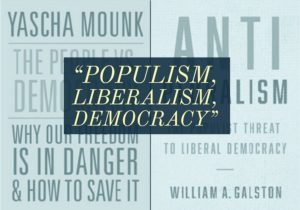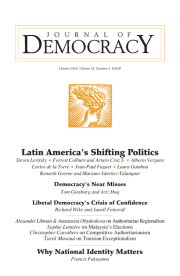
Brookings
By the end of World War Two, nationalism had been thoroughly discredited. Critics charged that national self-interest had prevented democratic governments from cooperating to end the Great Depression, and that nationalist passions had led not just to war, but also to some of the worst crimes groups of human beings had ever perpetrated on others, notes Brookings analyst William Galston.
The construction of international institutions and norms—in economics, politics, and human rights—as antidotes to nationalist excesses dominated Western diplomacy for decades after 1945, and the global struggle between liberal democracy and communism muted the expression of nationalist sentiments on both sides of the Iron Curtain, he writes for The American Interest.
 Our democratic future depends on whether publics come to see nationalism as the solution, the problem, or something in-between, adds Galston, a former National Endowment for Democracy board member, offering twelve theses on nationalism, including:
Our democratic future depends on whether publics come to see nationalism as the solution, the problem, or something in-between, adds Galston, a former National Endowment for Democracy board member, offering twelve theses on nationalism, including:
As a key source of social solidarity, nationalism can support higher-order political goods such as democracy and the welfare state. Democracy rests on mutual trust, without which the peaceful transfer of power comes to be regarded as risky. The welfare state rests on sympathy and concern for others who are vulnerable, whether or not the more fortunate members of the community see themselves as equally vulnerable. Shared nationality promotes these sentiments, while in the short-to-medium term (at least), increasing national diversity within states weakens them. RTWT
The functioning of democratic institutions depends on shared norms and perspectives and ultimately on a shared culture—all of which can exist on the level of a national state, but do not exist internationally, according to Stanford University’s Francis Fukuyama.
 Contrary to arguments that the concepts of national identity and state sovereignty have become outmoded, an inclusive sense of national identity remains critical to maintaining a successful modern political order, he wrote for the Journal of Democracy.* National identity not only enhances physical security, but also inspires good governance; facilitates economic development; fosters trust among citizens; engenders support for strong social safety nets; and ultimately makes possible liberal democracy itself.
Contrary to arguments that the concepts of national identity and state sovereignty have become outmoded, an inclusive sense of national identity remains critical to maintaining a successful modern political order, he wrote for the Journal of Democracy.* National identity not only enhances physical security, but also inspires good governance; facilitates economic development; fosters trust among citizens; engenders support for strong social safety nets; and ultimately makes possible liberal democracy itself.







